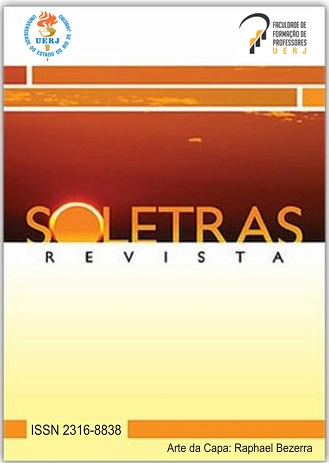Vai na fé: teledramaturgia na sala de aula para (re)construir a (eco)democracia brasileira
DOI:
https://doi.org/10.12957/soletras.2024.83007Resumo
O objetivo deste trabalho é problematizar as relações entre linguagem, fé, educação linguística e democracia forte e sustentável; e defender a inserção do tema fé nas práticas pedagógicas de educação linguística crítica e decolonial, especialmente neste momento de reconstrução da democracia brasileira. Segundo Kwok (2012), o diálogo interfé é prática imprescindível para a estabilidade das relações democráticas. Também argumentamos que a fé, como categoria discursiva, passa pela linguagem humana, sendo, portanto, objeto da Linguística Aplicada, o que justifica resgatar a temática, tradicionalmente ausente das discussões da área. Para construir a argumentação, partimos da compreensão do gênero telenovela como poderoso pulverizador de discursos no Brasil e no exterior, devido à enorme aceitação do gênero tanto no mercado interno brasileiro quanto no externo por meio da exportação de telenovelas para diversos países do mundo. A partir desse ponto, focamos na obra de teledramaturgia Vai na Fé (SVARTMAN, 2023), produzida e exibida pela TV Globo, e identificamos as respostas decoloniais à colonialidade do saber, do poder e do ser (QUIJANO, 2005) encontradas na construção da obra. Os resultados apontam as possibilidades de uso do gênero nas aulas de línguas para fomentar a construção de uma sociedade decolonial.
Downloads
Publicado
Edição
Seção
Licença
A aprovação dos artigos implica a cessão imediata e sem ônus dos direitos de publicação nesta revista. O(s) autor(es) autoriza(m) ao Programa de Pós-graduação em Letras e Linguística (PPLIN) a reproduzi-lo e publicá-lo na revista SOLETRAS, entendendo-se os termos “reprodução” e “publicação” conforme definição do artigo 5° da Lei 9610/98. O(s) autor(es) continuará(rão) a ter os direitos autorais para publicações posteriores. O artigo poderá ser acessado pela rede mundial de computadores (http://www.e-publicacoes.uerj.br/index.php/soletras), sendo permitidas, a título gratuito, a consulta e a reprodução de exemplar do artigo para uso próprio de quem o consulta. Casos de plágio ou quaisquer ilegalidades nos textos apresentados são de inteira responsabilidade de seus autores.



